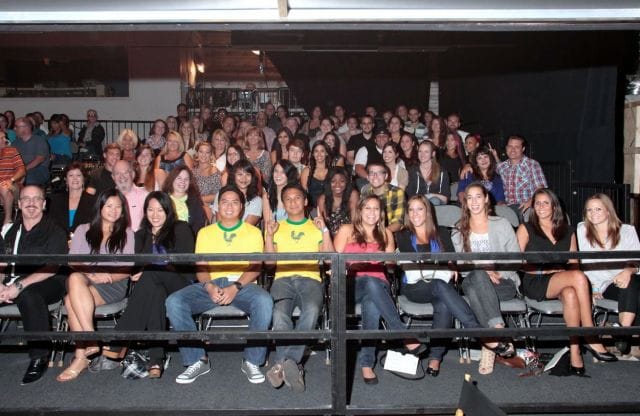Episodes: Why I want you to stop saying "laugh track," and why I am losing that war

Please stop saying the words "laugh track."
Look. I know I'm not going to get you to stop doing this. The public has grabbed hold of this phrase as a way of describing something that needs a description (that something being the laughter punctuating jokes in multi-camera sitcoms). It's a lot less clumsy to say than "live studio audience laughter," which is what we're listening to. For 99 percent of situations and for 99 percent of people who will talk about this topic, "laugh track" suffices.
But it carries with it associations that are instantly dismissive. "Laugh track" makes it far too easy to simply dismiss the multi-camera sitcom as something hokey and out of date, something that is forcing laughs, or straining for effect, or simply making up howls of laughter that aren't there.
You've heard the old story that the laughs you listen to in a sitcom are people from the 1950s, who are dead now, right? Well, that's not true. Shows with laugh tracks don't use those elements. How I Met Your Mother, for instance, used the track of laughter it recorded from its pilot (when the show briefly showed taped episodes to a studio audience, then recorded their laughter). And the handful of other shows that use laugh tracks use much more recently recorded laughter.
But nearly every multi-camera sitcom on television -- yes, even the one you hate -- uses a recording of a live studio audience for its laughter. That laughter is real. It's genuine. It's not even all that provoked. Being in an audience, and knowing your role in the "play" that is a multi-camera sitcom, and just the human expectation of doing the "right" thing -- they all play a part in getting you to laugh at stuff you might not find funny in the comfort of your own home. (You can read more about my experiences with this at a taping of Dads, in this post I did for the late, lamented Grantland.)
If you somehow watch that episode of Dads, you will hear me laughing along with everybody else. Is that laughter genuine? Sure. Did I think what was happening was funny? Not at all. But I'm a social primate like you. When I get into a situation like this, I'm going to laugh, because laughter is contagious and infectious. So would you. The idea that something you don't find funny at home wouldn't be funny in the studio is a ridiculous one, because the studio is such a different experience, where you're right there, with the actors, and you want to make sure they know you appreciate what they're doing. The show with the loudest, most reliably excited live studio audience is Fuller House. And that show's not funny at all.
So why stop saying laugh track? Well, because it shortchanges the multi-cams that are doing interesting things with the form, shows like The Carmichael Show and Mom and The Ranch. But it also implies that the problems with multi-cams (which are, indeed, present) are fixed by, say, working harder and writing better jokes and not counting on the robot laughs to wallpaper over everything. Yet they're not.
The live studio audience can be the savior of the multi-camera sitcom, if we're willing to listen to it. (Or, rather, if the producers are.) They play a character as surely as any actors do. The more they seem like just another interchangeable part in the whole, the less producers will think about what they represent. They're not robots -- so we should stop acting like they are.
Or just say laugh track. I'm aware this is a losing battle.
--
Episodes is published at least three times per week, and more if I feel like it. It is mostly about television, except when it's not. Suggest topics for future installments via email or on Twitter. Read more of my work at Vox Dot Com.




